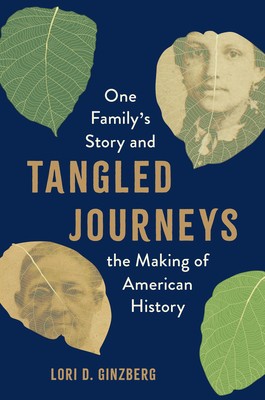
- We will send in 10–14 business days.
- Author: Lori D Ginzberg
- Publisher: University of North Carolina Press
- ISBN-10: 1469679965
- ISBN-13: 9781469679969
- Format: 15 x 22.6 x 2.3 cm, softcover
- Language: English
- SAVE -10% with code: EXTRA
Reviews
Description
In 1830 Richard Walpole Cogdell, a husband, father, and bank clerk in Charleston, South Carolina, purchased a fifteen-year-old enslaved girl, Sarah Martha Sanders. Before her death in 1850, she bore nine of his children, five of whom reached adulthood. In 1857, this all-too-ordinary story took an extraordinary turn when Cogdell and his enslaved children moved to Philadelphia, where he bought them a house and where they became, virtually overnight, part of the African American middle class. An ambitious historical narrative about the Sanders family, Tangled Journeys tells a multigenerational, multiracial story that is both traumatic and prosaic. At the same time, through what Ginzberg calls "whispers"--questions that the available evidence cannot answer but that force us to confront what was unseen, unheard, and undocumented--the author invites readers into the process of American history making, drawing back the curtain on the evidence historians encounter and interpret, and examining how this process reshapes our understanding of the past.
EXTRA 10 % discount with code: EXTRA
The promotion ends in 17d.20:01:54
The discount code is valid when purchasing from 10 €. Discounts do not stack.
- Author: Lori D Ginzberg
- Publisher: University of North Carolina Press
- ISBN-10: 1469679965
- ISBN-13: 9781469679969
- Format: 15 x 22.6 x 2.3 cm, softcover
- Language: English English
In 1830 Richard Walpole Cogdell, a husband, father, and bank clerk in Charleston, South Carolina, purchased a fifteen-year-old enslaved girl, Sarah Martha Sanders. Before her death in 1850, she bore nine of his children, five of whom reached adulthood. In 1857, this all-too-ordinary story took an extraordinary turn when Cogdell and his enslaved children moved to Philadelphia, where he bought them a house and where they became, virtually overnight, part of the African American middle class. An ambitious historical narrative about the Sanders family, Tangled Journeys tells a multigenerational, multiracial story that is both traumatic and prosaic. At the same time, through what Ginzberg calls "whispers"--questions that the available evidence cannot answer but that force us to confront what was unseen, unheard, and undocumented--the author invites readers into the process of American history making, drawing back the curtain on the evidence historians encounter and interpret, and examining how this process reshapes our understanding of the past.


Reviews